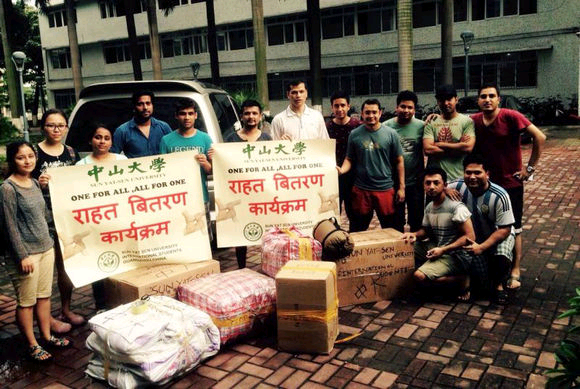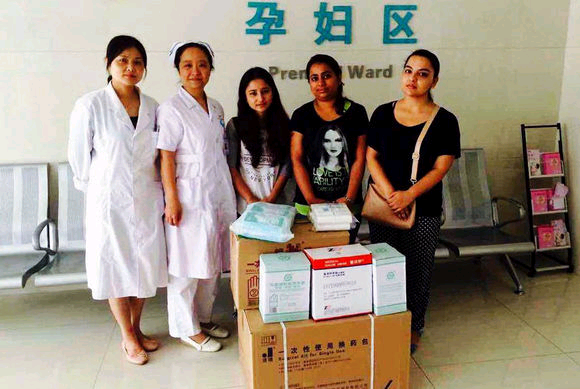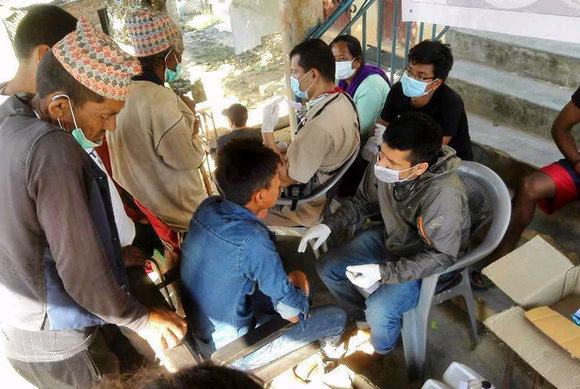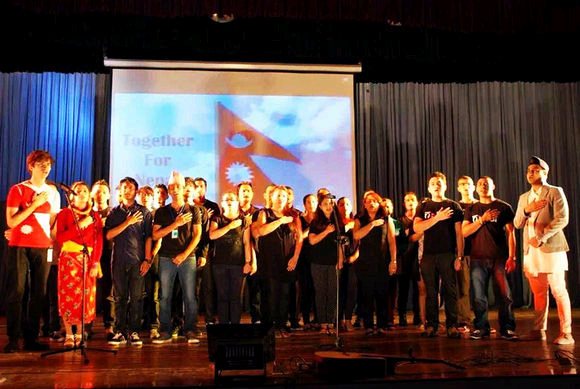Nepal Earthquake Galvanizes SYSU International Community
Source: Office for Overseas Promotion
Written by: Ian J. Heuer
Edited by: Wang Dongmei
On April 25, a magnitude 8.1 earthquake rocked the nation of Nepal. As the dust clouds settled and aftershocks echoed the initial jolt, the scale of the destruction became clear and the Himalayan nation confronted its worst natural disaster in over eighty years. Almost three thousand kilometers away in Guangzhou, the shocks were psychological, but no less visceral. For the close-knit contingent of Nepalese students at Sun Yat-sen University (SYSU), April 25th started like any other Saturday. The large majority of Nepalese students at SYSU are studying medical disciplines on the North Campus or in medical residencies in one of SYSU’s affiliated hospitals. Students were relaxing in their dorm rooms or chatting with friends when in the early afternoon, news started to come in that something had happened in Nepal. “We were in the room with some of our friends. I got a message in my phone from a friend in India who said she felt a shock,” said Joshila Yumnam, an Indian student who has close ties to the Nepalese student community. Reports continued to trickle in; at the outset, the nature of the events was hard to judge. “We have earthquakes every few years, and we assumed it was of the same scale and not that destructive,” said Manoj Kumar Choudhary, a SYSU medical student. Some heard reports of minor tremors and others heard of a bigger shock, but given the nature of earthquakes, it can be hard to judge the severity of the disaster based just on individual reports. When the seismographic measurements began to be reported, the students realized that something much more devastating was taking place. “We often have earthquakes around 5-6 on the Richter scale,” said Robin Bhattarai. “Then we saw on the Chinese news that this quake measured 8.1, and we knew this would be a catastrophe.” The students sprang into action, placing calls and sending messages to friends and family in Nepal.

Fundrasing on campus
Most of the students I spoke with were from areas of Nepal relatively lightly affected by the quake. But the aftermath of the events was no less personal, inflicting huge national damage on a human level and a physical level, but also on a more intangible level. Manoj described the importance that cultural heritage plays in the Nepalese national identity. “Our cultural heritage is a source of great pride and also attracts tourism, which is a big part of our economy. To think about the damage to cultural sites is devastating; every Nepalese has memories tied to these places that cannot be explained or replaced.” After the initial shock upon hearing the news, and the subsequent scramble to ensure that loved ones were safe, the students began to wonder what part they could play in what was sure to be a long, hard road to recovery. That evening, post-graduate Nepalese students held an impromptu meeting in which they sought to grasp what had happened and come up with a response. Sarju Raj Singh described the scene: “We held a meeting among the senior students and decided to pool some money together to send to Nepal. Word eventually got out and the effort immediately spread beyond just the Nepalese students to all the international students on campus.” Robin added: “We expected it to stay among ourselves and that was it, we had no idea how it would grow.”
They sent the proceeds from their informal collection drive to a group of SYSU alumni who had completed their studies and were conducting relief efforts back home in Nepal. When they saw the pictures of what the funds purchased, the emotional impact was profound. “We saw pictures of food and water that our funds had purchased and were given directly to victims in the affected areas. We were able to see the expressions on the faces of those who were directly helped by these donations. The pictures said everything,” said Robin. Sarju summed up their sentiments: “We saw the pictures and wanted to do more.”

Collecting first-aid supplies from SYSU’s affiliated hospitals
Students began working toward relief efforts every way they could. International students on North Campus set up a booth and began a fundraising drive. "We talked to the International Students Office and they supported our idea to collect donations inside the campus," said Sarju. A group of Indian students cooked large batches of an Indian rice dish Biriyani and set up a stand to sell it outside the market on campus. Students in medical residences collected first-aid supplies and funds from SYSU’s affiliated hospitals, specifically the Departments of Urology and OB/GYN at The Third Affiliated Hospital and the Department of Ear, Nose and Throat at The First Affiliated Hospital. Two current SYSU students from Nepal decided to return home to join with the SYSU alumni already on the ground to form a response team that would deliver the donated supplies directly to victims in the most hard-hit and inaccessible regions. One student, Dr. Prem Raj Shrestha, arrived in Nepal on May 2nd. “Imagine yourself in this situation … My profession is the treatment and prevention of post-disaster medical complications.” As an affected Nepalese national and trained professional, he saw it as his duty to help, helping operate a successful relief base in a village north of Gorkha city and distributing relief goods. The team of SYSU students and alumni in Nepal, relying on support from a range of institutions including SYSU and Lions Club of Lazimpat Chautari, allowed the SYSU fundraisers to see the direct impact that their efforts were having in aiding the disaster relief.

SYSU international students participating in earthquake relief in Nepal
The most high profile fundraising action undertaken by students was a benefit concert held on Sunday May 3rd on the North Campus. The idea for such an event, which was organized primarily by Nepalese undergraduate students, was a natural progression from earlier fundraising, according to Abhishek Kumar Patel. “First we collected some money, then some Indian students organized the sale of biriyani, and after that the next step was to plan the earthquake program.” The students partnered with the University's International Students Office and the Office for Overseas Promotion to spread the word about the event on WeChat, Facebook, and other social media. The program included a variety of performances, from traditional folk songs to contemporary dance forms. Included in the program was a presentation about the situation in Nepal, and an impassioned appeal for support from attendees. The final act of the show was a group performance of the song “We Are the World”, which served to perfectly underscore the feeling of communal effort and international cooperation that was generated by the concert. “Being here in this atmosphere really made the news about the earthquake hit home. I read about it in the news, but to hear stories from Nepalese students really humanizes the tragedy and gave a lot of people a real desire to do their part,” said Louis, an American SYSU student in attendance at the concert. In the end, the proceeds from the event proved to be the single largest amount of money raised from any one activity by SYSU students.

Together for Nepal benefit concert
There is still a long road ahead for relief efforts in Nepal. The students have set up their booth on the South Campus and continue the fund collection effort. They are also in the final stages of receiving a donation from The Sixth Affiliated Hospital. For many students on campus, whether Nepalese, other international students, or Chinese, the tragic events in Nepal have galvanized a sense of human community and mutual support. The Nepalese students on campus have served as shining examples of what is possible when people work together for a higher purpose. The relief efforts were extremely successful; they relied on many different people playing a small role which, taken together, combine to make a real and tangible difference in the lives of those people suffering. As one Nepalese student wrote on WeChat, a Chinese social network: “The whole country is in jeopardy right now. But hats off to all those who have worked for those affected by the quake. It’s really because of those involved that people can feel the presence of SYSU even in Nepal.” The feeling is mutual; the presence of Nepal in SYSU has never been stronger.
